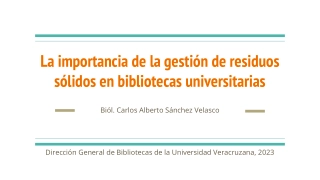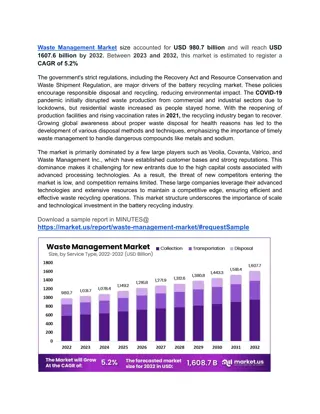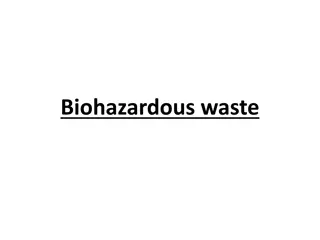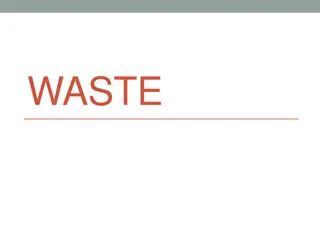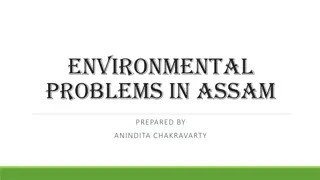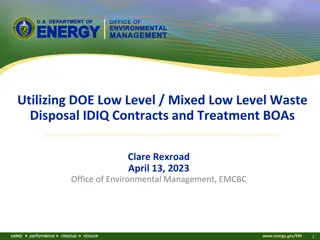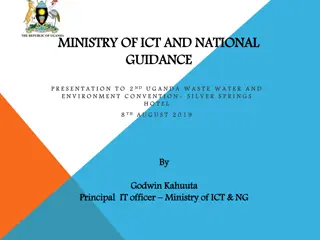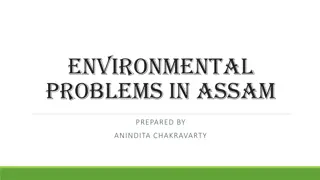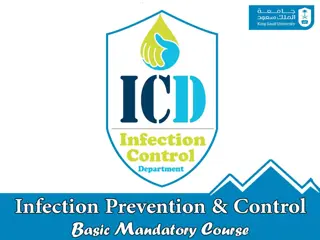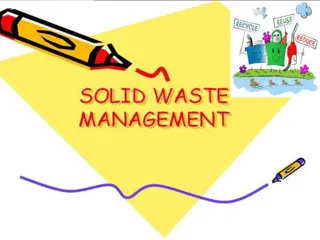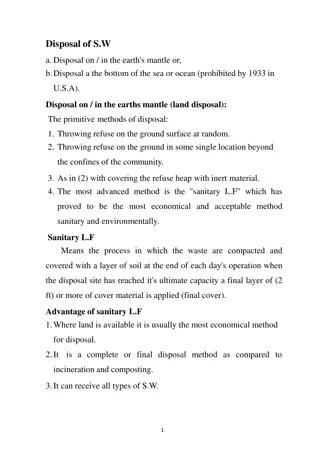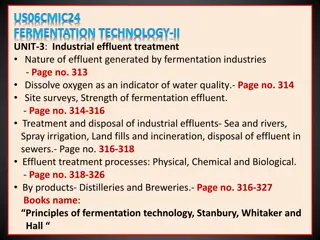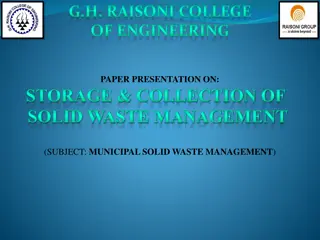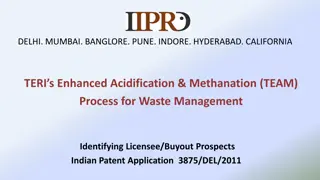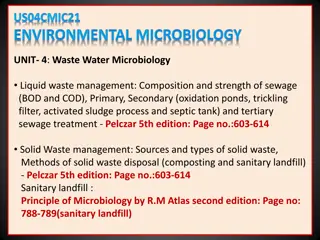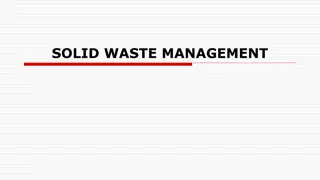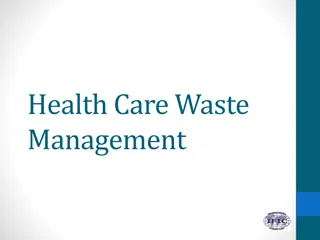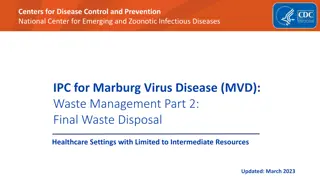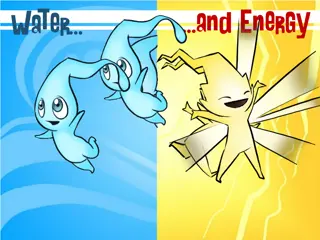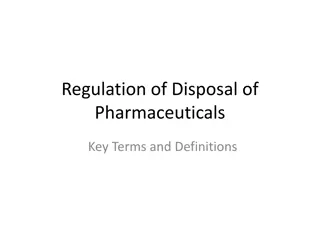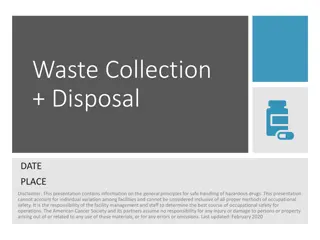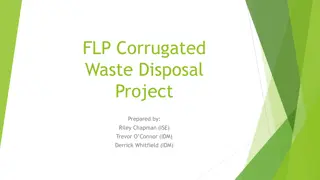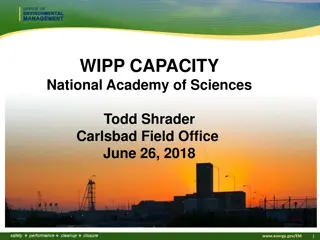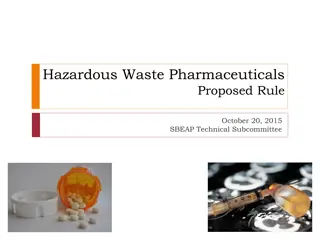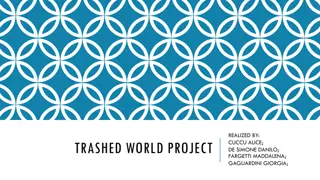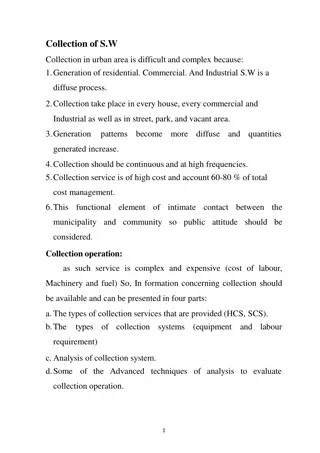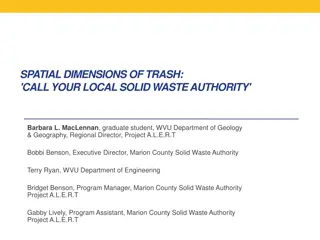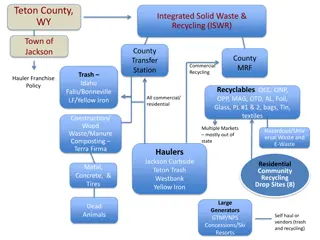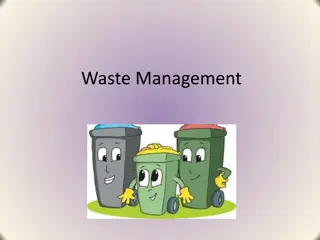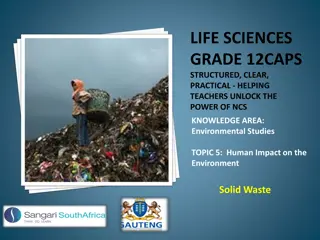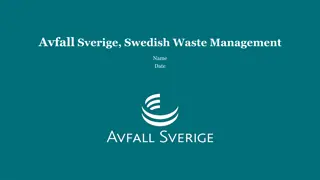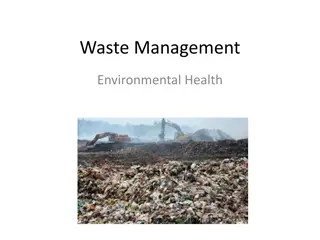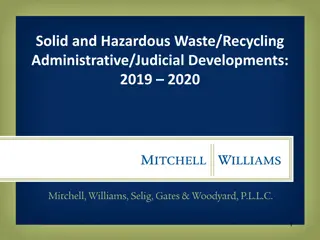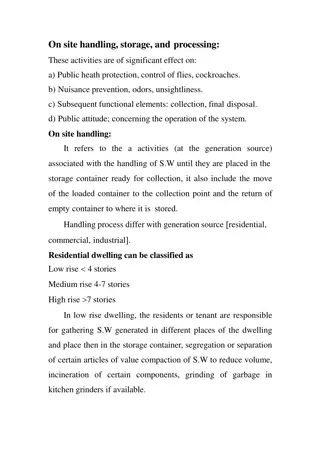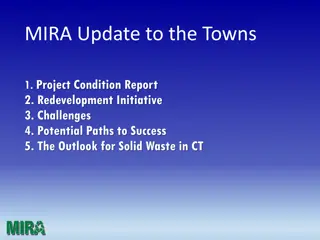SOLID COPPER EARTH ROD
Nexus Metal & Alloys is a leading manufacturer, exporter and supplier of Solid Copper Earth Rod, Solid Copper Bonded Rod, Solid Copper Earth Rod Lightning Protection Accessories, Pure Copper Bonded Rod, Electrolytic Copper Earth Rod, Solid copper rods, Solid Copper Earth Bars, Solid copper ground el
4 views • 3 slides
Importance of Solid Waste Management in University Libraries
Sensitizing and raising awareness among library staff about the significance and necessity of solid waste separation in alignment with the Sustainability Master Plan of the Universidad Veracruzana. The presentation discusses the causes and effects of solid waste issues, emphasizing economic losses a
4 views • 57 slides
Best Waste Services in Westminster
Looking for the Best Waste Services in Westminster, then visit Hart Waste and Recycling Services Ltd. They are a waste and recycling collection Service, they collect and dispose of waste and recycling at a convenient time of your choosing, 24 hours a day, & Seven days a week 365 days a year. They co
0 views • 6 slides
National Radioactive Waste Management Plan Overview
Briefing the Select Committee on Land Reform, Environment, Mineral Resources, and Energy about the South African Radioactive Waste Management Programme and the legislative background governing radioactive waste management. The presentation outlines the framework, guiding elements, waste management p
4 views • 19 slides
Waste Management Market Witnesses Technological Disruptions
Waste Management Market by Waste Type (Municipal Waste, Medical Waste, Industrial Waste, and E-Waste), By Service Type (Collection, Transportation, and Disposal), By End-User, By Region and Companies - Industry Segment Outlook, Market Assessment, Com
0 views • 4 slides
Waste Bureau Mandate Presentation Highlights
The Department of Forestry, Fisheries & the Environment's Waste Bureau presentation on May 25, 2021, outlined its legal mandate, operational performance, challenges, and key focus areas for 2021/22. The Waste Bureau functions as a specialist implementing agent, promotes waste minimization and recycl
1 views • 11 slides
Understanding Biohazardous Waste Management
Biohazardous waste poses a threat to living organisms, particularly humans, due to biological hazards like medical waste or toxins. This waste includes categories such as solid, liquid, sharps, and pathological waste, each requiring proper segregation and disposal to minimize health risks. Learn abo
0 views • 15 slides
The Growing Issue of Waste Generation
Solid waste, including discarded materials like garbage and refuse, is piling up rapidly, with the US alone generating over 10 billion metric tons annually. The trend of single-use products has exacerbated the problem, leading to a doubling of waste production per American since the 1960s. Disposal
0 views • 23 slides
Environmental Challenges in Assam: Solid Waste and Deforestation Issues
Assam faces critical environmental problems such as solid waste mismanagement and deforestation. The syllabus emphasizes three main issues: solid waste management, deforestation, and watershed management. Solid waste, categorized by origin, hazard potential, and contents, poses significant challenge
0 views • 15 slides
Utilizing DOE Low-Level & Mixed Low-Level Waste Disposal Contracts
EMCBC manages disposal and treatment contracts for Low-Level Waste (LLW) & Mixed Low-Level Waste (MLLW). Eligible users include DOE offices, prime contractors, and subcontractors. Services cover various waste types including radioactive materials, sealed sources, and TSCA-regulated waste. Specific c
0 views • 19 slides
E-Waste Policy Strategy & Guidelines for Sustainable Environmental Management
This presentation highlights the pressing issue of e-waste management in Uganda, focusing on the challenges of rising urban solid waste generation and inadequate disposal methods. It discusses the lack of awareness among manufacturers and consumers regarding the hazards of incorrect e-waste disposal
0 views • 14 slides
Environmental Challenges in Assam: Solid Waste Management, Deforestation & Watershed Management
Assam faces environmental problems related to solid waste management, deforestation, and watershed management. Solid waste, including municipal, industrial, and biomedical waste, poses a significant threat to human health if not handled properly. Deforestation, the permanent removal of trees for var
0 views • 15 slides
Waste Management Priorities in Solomon Islands
The presentation by Debra Kereseka at the PACWASTEPLUS Steering Committee Meeting highlighted key waste management priorities in the Solomon Islands. Topics covered include the management of different waste streams, challenges faced, and clarifications for the project management unit. Priorities inc
0 views • 7 slides
Comprehensive Guide to Hospital Waste Management and Infection Control
Understanding and effectively managing hospital waste is crucial for infection control. Learn about different types of hospital waste, proper segregation and disposal methods, and minimizing risks of hazardous agents. This guide covers offensive waste, infectious waste, disposal protocols, and more.
0 views • 19 slides
Understanding Solid Waste Management and Classification
Waste management encompasses a wide range of materials and practices, from solid and liquid waste to hazardous and non-hazardous substances. Learn about different types of waste, sources of waste generation, classifications based on health and environmental impact, as well as origins and types. Expl
0 views • 35 slides
Efficient Methods and Considerations for Solid Waste Disposal
Efficient methods for solid waste disposal include sanitary landfilling, which involves compacting waste and covering it with soil daily. Advantages of this method include economic viability and flexibility in waste disposal. However, challenges such as limited suitable land availability and potenti
0 views • 10 slides
Industrial Effluent Treatment in Fermentation Industries
Fermentation industries generate various types of effluent containing organic matter, solids, and other waste materials. With stricter regulations on waste disposal, efficient treatment methods are essential for controlled disposal. This includes physical, chemical, and biological processes to treat
0 views • 84 slides
Effective Solid Waste Management Strategies for Communities
Solid waste management is crucial for maintaining hygiene and preventing health hazards in communities. Proper storage and collection methods ensure efficient waste disposal and reduce environmental impact. This paper presentation discusses the importance of waste management, emphasizing the need fo
0 views • 43 slides
Innovative Waste Management Process for Sustainable Future
Introducing the TEAM process - Enhanced Acidification & Methanation, a revolutionary waste management solution for India. By extracting organics from solid waste, converting them into valuable resources, and generating power, this technology addresses the growing waste generation trends in the count
0 views • 17 slides
Understanding Waste Water Microbiology and Solid Waste Management
Waste water microbiology involves the analysis of liquid waste in terms of its composition, strength (BOD and COD), and treatment processes. It covers the sources and types of solid waste, along with methods of disposal like composting and sanitary landfilling. The chemical characteristics of waste
0 views • 36 slides
Understanding Solid Waste Management and Its Importance
Waste management includes the collection and treatment of solid waste to protect the environment. Waste is seen as a resource, with categories such as municipal and industrial waste. Proper waste management is crucial to prevent pollution and disease outbreaks. Principles include an integrated appro
0 views • 20 slides
Effective Health Care Waste Management Guidelines
Proper management of health care waste is crucial for creating a safer environment for staff, waste workers, and the public. This involves describing various types of waste, outlining waste sources, segregating waste appropriately, and listing treatment options. Key points include focusing on sharps
1 views • 28 slides
Proper Waste Disposal in Healthcare Settings for Marburg Virus Disease
In healthcare settings, proper waste disposal is crucial during outbreaks like Marburg virus disease to prevent health risks for patients, staff, and the community. This involves incineration or non-burn treatment of infectious waste before disposal, emphasizing the importance of appropriate waste m
0 views • 16 slides
Understanding Waste Management: Facts and Solutions
In this informative content, the importance of energy conservation, water preservation, and waste management is highlighted. It sheds light on the limited availability of usable water on our planet, the need for renewable energy sources, and the impact of waste generation on the environment. Learn a
0 views • 52 slides
Regulations and Disposal of Pharmaceuticals Key Terms
Understanding the regulations around the disposal of pharmaceuticals is crucial to protect the environment and ensure safe practices. Unwanted pharmaceuticals should not be disposed of with regular trash or flushed as they can affect water resources. Incineration, governed by federal Clean Air Act r
0 views • 7 slides
Proper Handling and Disposal of Hazardous Drugs and Waste
Guidelines for the safe handling and disposal of hazardous drugs and waste in healthcare facilities. The content covers training modules, waste collection, sources of healthcare waste, disposal methods, and legal regulations related to the disposal of hazardous drugs. Various types of healthcare was
0 views • 21 slides
FLP Corrugated Waste Disposal Project Overview
This project aims to improve the efficiency and cost-effectiveness of the current corrugated waste disposal process. By implementing alternative designs and reengineering processes, the goal is to increase labor efficiency by 10%, reduce waste disposal costs by 10%, and provide recommendations for s
0 views • 8 slides
WIPP Waste Disposal Capacity Overview
The Waste Isolation Pilot Plant (WIPP) has a statutory capacity of up to 175,565 cubic meters for disposal of transuranic waste. As of June 2018, 93,500 cubic meters of TRU waste have been emplaced at WIPP. The facility operates within the 16 square mile land withdrawal boundary specified by the WIP
0 views • 8 slides
Hazardous Waste Pharmaceuticals Proposed Rule Overview
This briefing provides an in-depth look at the Hazardous Waste Pharmaceuticals Proposed Rule from October 20, 2015. It covers which pharmaceuticals are considered hazardous waste, major provisions of the proposal, examples of listed hazardous waste pharmaceuticals, and the flow of hazardous waste ph
0 views • 40 slides
Understanding Waste Management and Pollution Issues in our Community
A group of individuals conducted research on waste production in Italy, highlighting the significant amount of waste generated annually. They also explored the presence of waste disposal facilities in their area, emphasizing the importance of using bins for waste disposal to maintain a clean environ
0 views • 9 slides
Challenges and Strategies in Solid Waste Collection in Urban Areas
Solid waste collection in urban areas is complex due to the diffuse nature of waste generation, varied collection locations, increased quantities of waste, high costs, and the need for continuous service. Different collection methods and systems such as curbside pick-up, alley service, set-out set-b
0 views • 5 slides
Understanding the Spatial Dimensions of Trash
Exploring the spatial impact of trash generation and disposal, this content delves into the role of local solid waste authorities in managing waste, promoting recycling, and ensuring proper waste disposal practices. From defining solid waste to the functions of waste authorities, the importance of r
0 views • 20 slides
Waste Management Overview in Wyoming and Idaho Counties
Explore the waste management strategies in Teton County, WY; Fremont County, ID; Madison County; and Bonneville County. Learn about integrated solid waste and recycling programs, landfill operations, recycling drop-off locations, hazardous waste disposal, and partnerships with recycling facilities.
0 views • 5 slides
Challenges in Waste Management and Disposal: A Critical Overview
Managing waste disposal poses significant challenges globally, with issues ranging from solid waste in limited landfills to liquid waste polluting waterways. Despite increased awareness, per capita waste production continues to rise, necessitating sustainable solutions to minimize negative impacts o
0 views • 17 slides
Managing Solid Waste: Importance, Risks, and Solutions
Solid waste management is crucial to address environmental hazards such as disease spread, respiratory issues, and toxin release. By reducing and managing solid waste effectively, we can improve public health and prevent pollution of soil and water bodies. The presentation highlights reasons to mini
0 views • 64 slides
Sustainable Practices in Swedish Waste Management
Avfall Sverige, the trade association for waste management in Sweden, focuses on reducing waste and increasing recycling rates. With a vision of zero waste, they work towards influencing, developing, and cooperating to achieve sustainable waste management practices. Swedish waste management statisti
0 views • 9 slides
Understanding Waste Management and its Environmental Impact in Pakistan
In Pakistan, approximately 20 million tons of solid waste is generated annually, with Karachi alone producing over 9,000 tons of municipal waste daily. Waste is defined by the Basel Convention as substances intended for disposal, encompassing various types such as solid and liquid wastes. Classifica
0 views • 40 slides
Recent Developments in Solid and Hazardous Waste Recycling Regulations
This article discusses various administrative and judicial developments in solid and hazardous waste recycling, focusing on federal and state decisions, litigation, regulations, and policies from the past year. It also delves into the specific waste issues associated with Arkansas Medical Marijuana
0 views • 67 slides
Effective On-Site Handling, Storage, and Processing of Solid Waste
On-site handling, storage, and processing of solid waste play a crucial role in public health protection, nuisance prevention, and waste management. The activities involve gathering, segregating, and compacting waste to reduce volume. Different methods are used based on the type of residential build
0 views • 8 slides
MIRA Update & Redevelopment Initiative for Solid Waste Management
The project involves assessing MIRA's financial and facility conditions, challenges faced in CT's solid waste management policy, along with a redevelopment initiative for sustainable waste disposal. Key aspects include financial reports, facility constraints, policy goals, and the planned redevelopm
0 views • 13 slides

